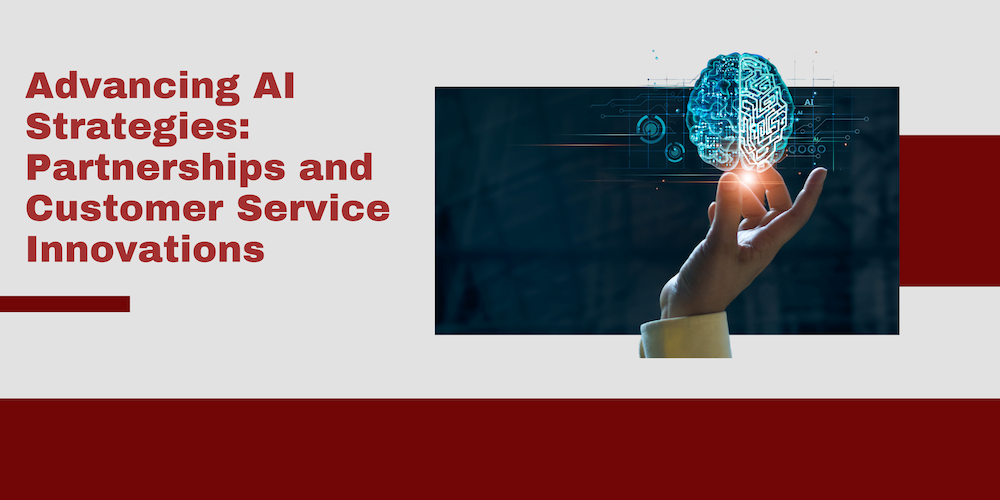Are you considering implementing AI-driven solutions to enhance your customer support processes?
In our exploration today, I hope to dive together into two compelling narratives: the strategic alliances brokered by Shutterstock with tech giants for AI training, and the disruptive influence of AI in reshaping the landscape of customer service.
Are you ready to delve deep into these developments and explore how they’re setting new standards and expectations in the technology sphere?
Leveraging AI Partnerships: Insights from Shutterstock and Tech Giants
In the evolving landscape of AI, partnerships between industry leaders like Shutterstock and tech giants such as OpenAI, Meta, Google, Amazon, and Apple offer valuable insights into the strategic utilization of AI resources. Let’s exame these partnerships, and learn an important lessons on how to leverage AI effectively and maximize its potential impact.
Understanding AI Training Data Partnerships: Shutterstock, a prominent stock image company, has forged significant AI-training deals with major tech companies, granting them access to its extensive library of images, videos, and music for AI model training.
Key Insights:
- Strategic Collaboration: These partnerships highlight the strategic collaboration between content providers like Shutterstock and technology innovators. By sharing access to vast datasets, tech giants enhance their AI models’ capabilities, while content providers gain revenue and exposure.
- Value Expansion: What began as licensing deals between Shutterstock and tech companies have evolved into comprehensive partnerships, underscoring the increasing value of AI training data. This demonstrates the potential for symbiotic relationships between content creators and AI developers.
- Ethical Considerations: Shutterstock’s emphasis on addressing copyright and quality concerns associated with AI-generated content sets a precedent for ethical AI practices. By prioritizing artist compensation and legality, Shutterstock ensures sustainable partnerships and fosters trust in AI technology.
Implications for Your Company:
- Data Monetization Opportunities: Companies with extensive datasets, particularly in industries like media, e-commerce, and entertainment, can explore opportunities to monetize their data through strategic AI partnerships. By offering access to valuable data assets, businesses can forge lucrative collaborations with AI developers.
- Ethical AI Practices: Upholding ethical standards in AI development, including copyright compliance and artist compensation, is essential for fostering long-term partnerships and mitigating legal risks. Companies must prioritize ethical considerations to build trust and credibility in the AI ecosystem.
- Innovation Through Collaboration: Collaborative efforts between content providers and AI developers drive innovation and technological advancement. By leveraging each other’s strengths, companies can unlock new opportunities for AI-driven solutions that benefit both parties and the broader industry.
Conclusion:
The partnerships between Shutterstock and tech giants underscore the transformative potential of AI collaborations in driving innovation and value creation. By understanding the dynamics of these partnerships and embracing ethical AI practices, companies can unlock new opportunities for leveraging AI to enhance their operations and deliver superior customer experiences.
Sources:
Navigating the AI-Driven Customer Service Landscape: Challenges and Strategies
In the customer service world, AI and automation promise heightened efficiency and customer satisfaction. However, leveraging the vast data generated by these technologies presents significant challenges.
Next on the agenda: exploring these hurdles, drawing insights from industry reports and examples to outline practical approaches for enhancing customer operations.
The AI Readiness Gap:
- Despite the accelerating adoption of AI in customer service, there exists a notable gap between leadership enthusiasm and frontline readiness.
- According to the Intercom report, while 62% of support leaders are eager to harness AI’s potential, only 42% of frontline practitioners share the same level of confidence.
Strategies for Bridging the Gap:
To bridge this readiness gap, it is crucial for leaders to not only advocate for the benefits of AI but also to invest in training and support systems for practitioners. This includes:
- Providing comprehensive training on AI tools
- Fostering a culture of experimentation and learning
Additionally, establishing clear metrics for measuring the success of AI implementations is essential.

Data Observability in AI Systems:
In the context of customer service, where AI systems generate a significant amount of data, understanding and managing this data becomes critical. Data observability offers a framework through which businesses can monitor and maintain the health of their data systems.
- According to industry reports, 78% of organizations identify real-time monitoring as the most important aspect of data observability.
- Comprehensive logging and automated anomaly detection follow closely behind, indicating the significance of these practices in maintaining data integrity.
Strategies for Data Observability: Implementing robust data pipelines is crucial for ensuring data integrity and reliability. These pipelines facilitate the smooth flow of data through AI systems and enable organizations to identify and address issues promptly.
- Employing advanced monitoring tools further enhances data observability by facilitating proactive issue identification and resolution.
- Additionally, fostering a culture of data-centric decision-making among teams ensures that data integrity remains a top priority across the organization.
Conclusion:
As businesses integrate AI solutions into their customer service operations, addressing challenges in harnessing AI-generated data is paramount. By bridging the AI readiness gap and implementing robust data observability practices, businesses can optimize their customer service operations and meet the evolving demands of customers. The strategic integration of AI technologies and human expertise promises to enhance customer service experiences and drive operational excellence in the digital age.
Source:

